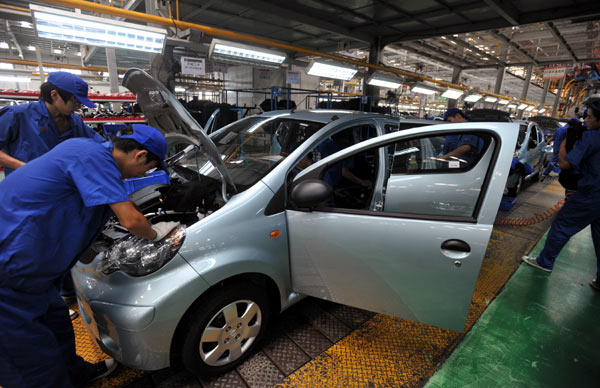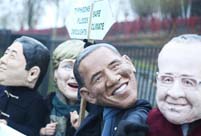 |
| A production line owned by BYD Co, a leading electric car manufacturer. China has been one of the major frontiers for new energy vehicles after the country provided many favorable policies in recent years to ease its heavy dependence on imported oil, cut emissions and speed the restructuring of the automobile sector. (Photo: China Daily) |
BEIJING, Nov. 27 (Xinhuanet) -- Four ministries are throwing their collective weight behind alternative-fuel vehicles, with a new round of subsidies set for more than two dozen cities and urban clusters by 2015.
The Ministry of Finance, the Ministry of Science and Technology, the Ministry of Industry and Information Technology and the National Development and Reform Commission on Monday jointly confirmed that 28 cities and areas had their applications approved to promote new-energy vehicles.
The cities include Beijing, Shanghai, Tianjin, Chongqing, Guangzhou, Shenzhen, Dalian, Ningbo, Qingdao, Wuhu and major provincial capitals.
Also on the list are urban clusters in Hebei, Zhejiang, Fujian, Jiangxi and Guangdong provinces.
The big cities on the list must have at least 10,000 new-energy vehicles in service by 2015, while smaller cities need at least 5,000.
Owners of pure electric passenger vehicles are eligible for subsidies of 35,000 yuan ($5,745) to 60,000 yuan. The subsidy for plug-in hybrids will be 35,000 yuan.
Subsidies for pure electric buses will range from 300,000 to 500,000 yuan, while those for hybrid buses will be 250,000 yuan.
Fuel cell vehicles will be the biggest beneficiaries, with subsidies of 500,000 yuan each.
The ministries urged local governments to use new-energy vehicles as official cars and in public transportation. The central government is requiring local governments to have at least 30 percent new-energy vehicles in their official fleets and mass transit systems.
To avoid regional protection, the government has told local governments to buy more than 30 percent of their new-energy vehicles from elsewhere in the country.
Last year, China set an ambitious annual target of producing and selling 500,000 energy-efficient and alternative-fuel vehicles by 2015, and 5 million green vehicles by 2020.
The blueprint is expected to help achieve an annual production capacity of 2 million pure electric and plug-in hybrid vehicles by 2020, the plan said.
Last year, the government offered subsidies totaling 26.5 billion yuan to stimulate purchases of energy-efficient products, mainly automobiles and household appliances.
China has been a "frontier" for new-energy vehicles, as the country drew up many favorable policies in recent years to ease its heavy dependence on imported oil, cut emissions and speed the restructuring of the automobile sector.
Though the majority of the support policies will apply to domestic brands, the potential for market development has attracted foreign vehicle producers, especially leaders in the sector.
Germany-based luxury vehicle producer BMW AG made Beijing one of the three premiere cities in the world for its pure-electric i3 cars on July 29.
United States-based electric car producer Tesla Motors Inc this month opened its first showroom in China, taking pre-orders for its Model S four-door sportscars from customers at its Beijing location.
Mercedes-Benz last week became the first European manufacturer to import pure electric vehicles into China.
 Finland has more eggs in the Chinese basket than any other
Finland has more eggs in the Chinese basket than any other In pictures: PLA's digital equipment
In pictures: PLA's digital equipment  Protesters demonstrate during UN Climate Change Conference in Poland
Protesters demonstrate during UN Climate Change Conference in Poland  Self-made farmer billionaire donates 69 villas at hometown
Self-made farmer billionaire donates 69 villas at hometown Demolition of bizarre rooftop villa in Beijing still in progress
Demolition of bizarre rooftop villa in Beijing still in progress Service seminar for E China train attendants
Service seminar for E China train attendants  Supermodel-turned-designer
Supermodel-turned-designer Cheerleaders light up CBA regular season
Cheerleaders light up CBA regular season  Finland--anytime you want is right time to go: Ambassador
Finland--anytime you want is right time to go: Ambassador Maritime counter-terrorism drill
Maritime counter-terrorism drill Splendid views of cities blanketed with fog
Splendid views of cities blanketed with fog  Models dazzle at Int'l Yacht Model Pageant
Models dazzle at Int'l Yacht Model Pageant  How to apply for a green card in China
How to apply for a green card in China Annual Santa Claus parade held in Canada's Montreal
Annual Santa Claus parade held in Canada's Montreal Weekly Sports Photos
Weekly Sports PhotosDay|Week|Month